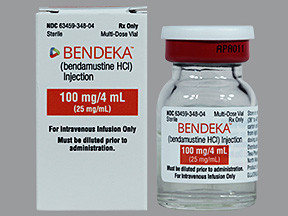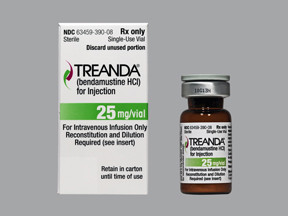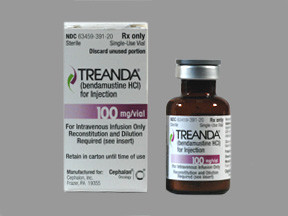BENDAMUSTINE - INJECTION
PHONETIC PRONUNCIATION: (BEN-da-MUS-teen)
COMMON BRAND NAME(S): Bendeka, Treanda
GENERIC NAME(S): bendamustine HCl
Uses
USES: This medication is used to treat certain types of cancer (e.g., chronic lymphocytic leukemia-CLL, B-cell non-Hodgkin's lymphoma). Bendamustine belongs to a class of cancer chemotherapy drugs known as alkylating agents. It works by killing cancer cells or slowing their growth.
How to use BENDAMUSTINE - INJECTION
HOW TO USE: This medication is injected slowly into a vein by a health care professional as directed by your doctor. The dosage is based on your medical condition, body size, and response to treatment. Before each cycle, you should have blood tests to find the best dose for you and to see whether you need to wait before receiving this drug again. Before you receive this medication, your doctor may direct you to take a fever reducer, an antihistamine, and a corticosteroid such as dexamethasone to help prevent side effects. Use these additional medications exactly as directed by your doctor. (See also Side Effects section.) If bendamustine leaks out of the vein into the surrounding area, it may cause serious skin and tissue damage. Tell your health care professional right away if you experience pain, irritation, redness, or swelling at the injection site. Prompt treatment of the leakage will help reduce discomfort and possible skin damage.
Side Effects
Precautions
Interactions
Overdose
Images
Reviews
Faq for BENDAMUSTINE - INJECTION
Bendamustine is used to treat certain types of cancer, including chronic lymphocytic leukemia (CLL), non-Hodgkin's lymphoma, and multiple myeloma. It is a chemotherapy medication that works by slowing or stopping the growth of cancer cells.
Bendamustine is given through a vein (intravenously) by a healthcare professional. The dosage and frequency of administration will depend on the specific type of cancer being treated and other individual factors.
Common side effects of Bendamustine include nausea, vomiting, diarrhea, constipation, tiredness, headache, muscle or joint pain, and fever. It can also cause low blood cell counts, which may increase the risk of infection or bleeding.
Patients should inform their doctor about any allergies, medical conditions, or medications they are taking before starting Bendamustine. It may interact with other drugs or have harmful effects in certain situations. Pregnant or breastfeeding women should also avoid using Bendamustine.
If a dose of Bendamustine is missed, patients are advised to contact their healthcare provider immediately for instructions. It is important not to double the dose to make up for a missed one.
The duration of Bendamustine treatment will vary depending on the individual and the specific cancer being treated. It is usually given in cycles lasting a few days, with breaks in between to allow the body to recover.
Some individuals may experience long-term complications from Bendamustine treatment, including damage to certain organs, increased risk of other types of cancer, or fertility problems. These risks should be discussed with a doctor before starting treatment.
Bendamustine can be effective in treating certain types of cancer, but it does not guarantee a cure. The response to treatment will vary for each patient, and it is important to discuss realistic expectations with a healthcare provider.
Hair loss is a potential side effect of Bendamustine treatment, but it does not occur in all patients. The likelihood and extent of hair loss can vary, and it may or may not be permanent.
Disclaimer
IMPORTANT: HOW TO USE THIS INFORMATION: This is a summary and does NOT have all possible information about this product. This information does not assure that this product is safe, effective, or appropriate for you. This information is not individual medical advice and does not substitute for the advice of your health care professional. Always ask your health care professional for complete information about this product and your specific health needs.



No Reviews Yet